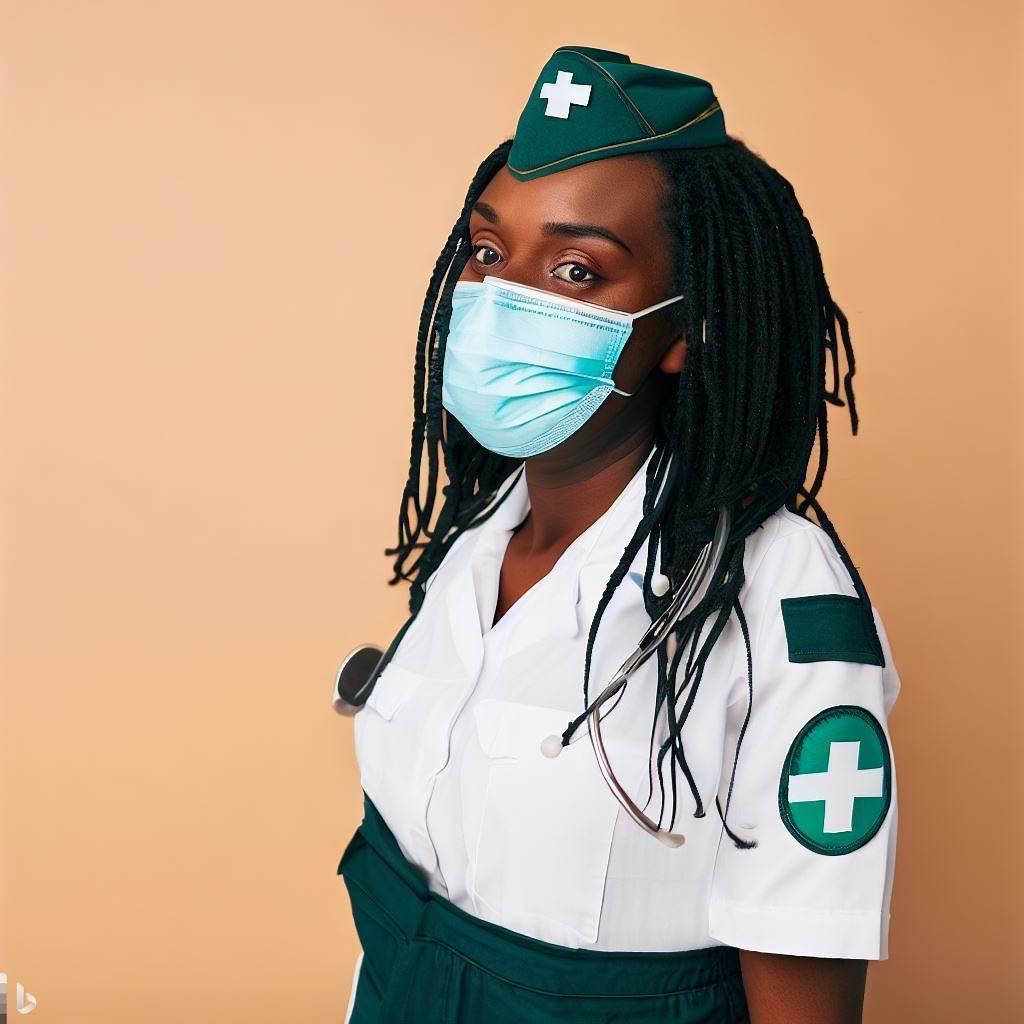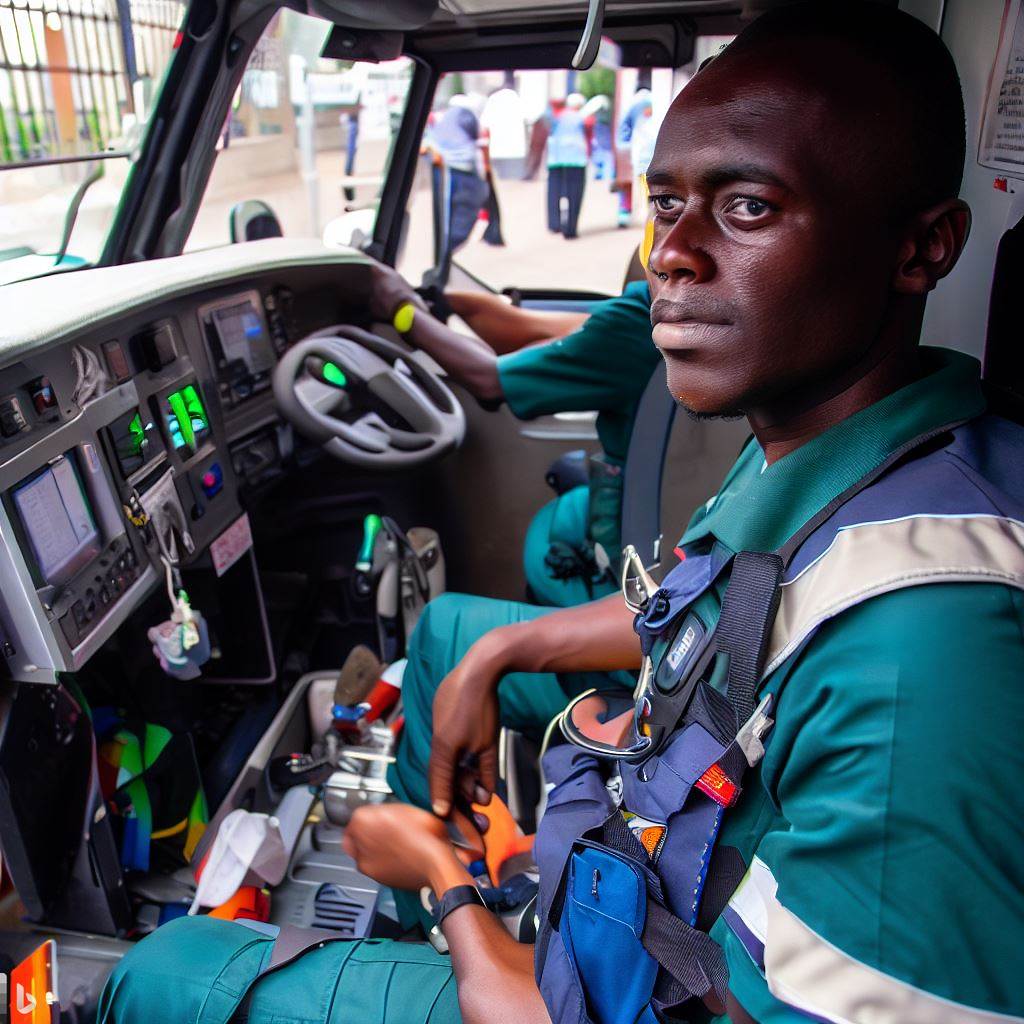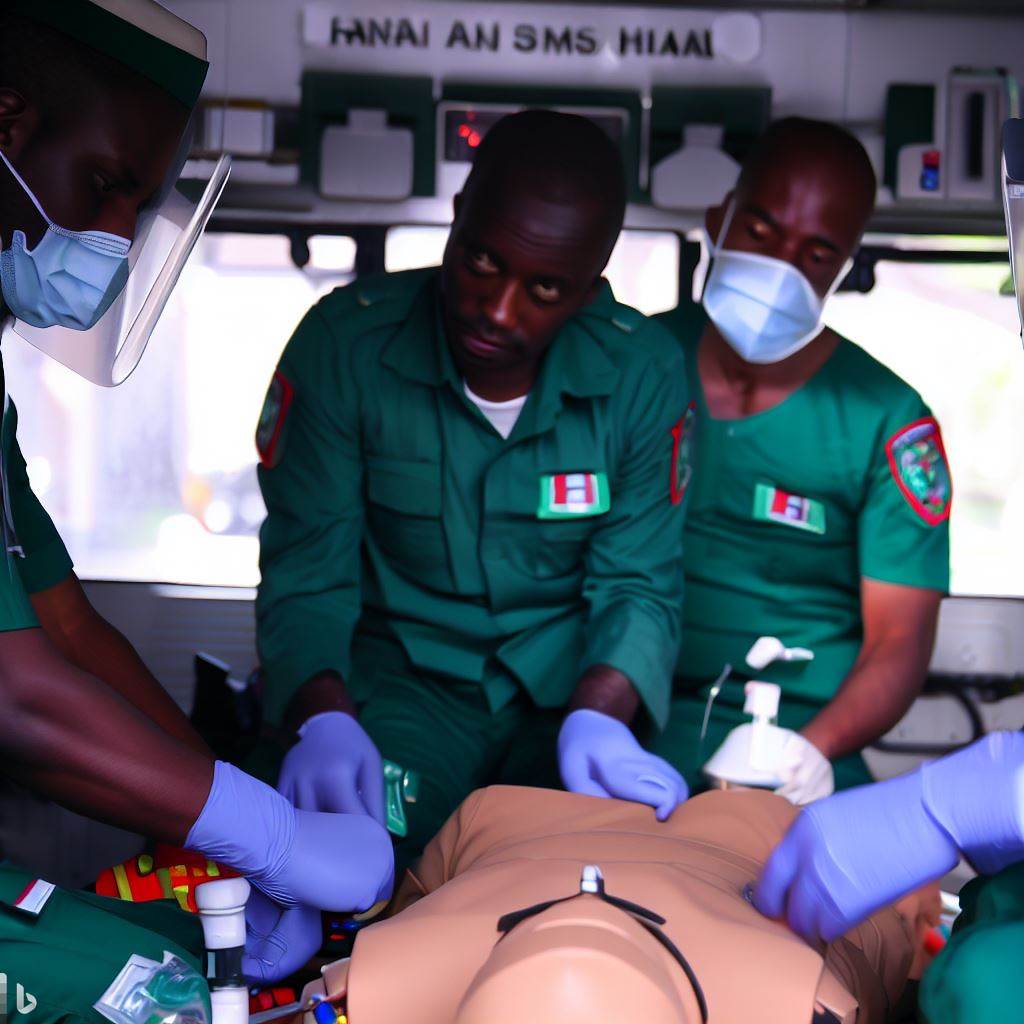Introduction
COVID-19, caused by SARS-CoV-2, shook the world with its devastating impact on health systems and economies.
This chapter focuses on the plight of Nigerian paramedics, frontliners battling COVID-19 head-on.
COVID-19’s global impact, Challenges faced by Nigerian paramedics, Strain on healthcare resources, psychological toll on paramedics, PPE shortages and risks, adaptation and resilience of paramedics, support and recognition for their efforts.
The COVID-19 pandemic brought unprecedented challenges, and paramedics in Nigeria have been at the forefront, risking their lives to save others.
This section delves into their struggles, resilience, and the urgent need for support.
Overview of Paramedics in Nigeria
Paramedics in Nigeria have long faced various challenges in their efforts to provide quality emergency medical care.
Pre-COVID-19, these challenges were already posing significant obstacles to the effectiveness and efficiency of the healthcare system.
Definition and role of paramedics
Paramedics are highly skilled medical professionals trained to provide emergency medical care.
Their role includes assessing patient conditions, administering medication, and stabilizing patients before they reach the hospital.
Paramedics play a vital role in the healthcare system by providing immediate care in critical situations. The definition and role of paramedics in Nigeria are crucial to understand their contributions.
Paramedics are highly trained medical professionals equipped with the knowledge and skills to provide immediate medical care in emergencies.
They are often the first responders to arrive at the scene, and their role involves assessing patient conditions, administering medication, and stabilizing patients before they reach the hospital.
Their swift response and expertise can have a profound impact on patient outcomes.
Importance of paramedics in the healthcare system
Paramedics are often the first healthcare professionals to arrive at the scene of an emergency. Their quick response and expertise can significantly improve patient outcomes.
They bridge the gap between the scene of an emergency and the hospital, ensuring that patients receive timely and appropriate care.
Paramedics also provide emotional support to patients and their families during traumatic events.
Paramedics play a vital role in the healthcare system by bridging the gap between the scene of an emergency and the hospital.
They ensure that patients receive timely and appropriate care during critical situations.
Their ability to provide immediate medical attention significantly increases the chances of survival and recovery for patients.
Challenges faced by paramedics in Nigeria pre-COVID-19
- Lack of adequate training and education programs for paramedics.
- Inadequate funding and resources for emergency medical services.
- Insufficient number of trained paramedics, leading to high workload and burnout.
- Poor infrastructure and transportation systems that hinder timely response to emergencies.
- Limited access to medical supplies and equipment needed for emergency care.
- Lack of public awareness and appreciation for the role of paramedics in healthcare.
However, the challenges faced by paramedics in Nigeria pre-COVID-19 have hindered their effectiveness.
The lack of adequate training and education programs for paramedics has limited their ability to acquire essential skills and keep up with advancing medical practices.
Moreover, the insufficient funding and resources allocated to emergency medical services have further compounded these challenges.
The shortage of trained paramedics in Nigeria has resulted in a high workload and increased levels of burnout.
The demanding nature of their job, combined with inadequate support, puts immense pressure on paramedics and affects the quality of care they can provide.
Additionally, the poor infrastructure and transportation systems in the country make it challenging for paramedics to respond promptly to emergencies, particularly in remote areas.
Furthermore, limited access to necessary medical supplies and equipment has compromised the ability of paramedics to deliver optimal care in emergencies.
The lack of availability of essential tools and resources directly impacts patient outcomes and the overall quality of emergency medical services in Nigeria.
Unfortunately, there is also a general lack of public awareness and appreciation for the crucial role paramedics play in healthcare.
This lack of recognition further intensifies the challenges faced by paramedics, as it affects their support and resources.
In the end, paramedics in Nigeria face numerous challenges in providing emergency medical care.
The importance of their role cannot be overstated, as they are the frontline responders who provide immediate care and support in critical situations.
Addressing these challenges is crucial for improving the effectiveness and efficiency of the healthcare system in Nigeria.
Read: Road to Becoming a Successful Paramedic in Nigeria
Emergence of COVID-19 in Nigeria
The emergence of COVID-19 in Nigeria has had a significant impact on the ambulance personnel in the country.
Let’s delve into the details of how this unfolded and the subsequent actions taken by the Nigerian government to control the spread.
Date and circumstances of the first confirmed case in Nigeria
The first confirmed case of COVID-19 in Nigeria was reported on February 27, 2020.
The patient was an Italian citizen who had arrived in Lagos, Nigeria on February 24, 2020, for business purposes.
He developed symptoms on February 26, prompting him to seek medical attention at a private hospital in Lagos. Subsequent tests confirmed that he was infected with the novel coronavirus.
Rapid spread of the virus in the country
Following the confirmation of the first case, the virus spread rapidly throughout Nigeria. Within a week, the number of confirmed cases had risen to 10.
By the end of March, the total number of cases had skyrocketed to over 1,000.
The rate of infection was alarming, putting immense pressure on the healthcare system, including paramedics who were at the frontlines of the battle against the virus.
Actions taken by the Nigerian government to control the spread
The Nigerian government took swift and decisive actions to control the spread of COVID-19. On March 30, 2020, President Muhammadu Buhari announced a lockdown in Lagos, Abuja, and Ogun State.
This was a crucial measure to curtail the movement of people and limit the transmission of the virus. The restrictions included the closure of non-essential businesses, schools, and limitations on public gatherings.
Additionally, the government established isolation centers and designated hospitals to provide adequate medical care for COVID-19 patients.
They also ramped up testing efforts, increased contact tracing, and implemented awareness campaigns to educate the public about preventive measures such as hand hygiene, wearing face masks, and practicing social distancing.
To support the healthcare system, the Nigerian government allocated funds for the procurement of personal protective equipment (PPE) for healthcare workers, including paramedics.
These PPEs are crucial in safeguarding the health and safety of the paramedics who are directly exposed to COVID-19 patients during their duties.
In fact, the emergence of COVID-19 in Nigeria has had a profound impact on paramedics. They have faced unprecedented challenges due to the rapid spread of the virus.
Nonetheless, the Nigerian government has taken commendable actions to control the spread, including imposing a lockdown, establishing isolation centers, and providing necessary resources to protect the paramedics and other healthcare workers.
It is essential to continue supporting and recognizing the efforts of these frontline heroes as they battle this global pandemic.
Read: Exploring Paramedic Training Opportunities in Nigeria
Increased Demands and Challenges for Paramedics
Surge in emergency calls related to COVID-19 cases
The COVID-19 pandemic has resulted in a significant increase in emergency calls for paramedics in Nigeria.
Paramedics are constantly responding to a surge in calls from individuals suspected of having COVID-19 symptoms.
These calls often require paramedics to assess patients, provide necessary treatment, and transport them to healthcare facilities.
This surge in emergency calls has put a tremendous strain on paramedics, requiring them to work longer hours and handle a higher workload.
Insufficient personal protective equipment (PPE)
One of the major challenges faced by paramedics in Nigeria during the COVID-19 pandemic is the lack of adequate personal protective equipment (PPE).
Paramedics are exposed to the risk of contracting the virus themselves due to the shortage of essential protective equipment.
Without proper PPE, paramedics are not only putting themselves at risk but also risking the transmission of the virus to their colleagues and patients.
This shortage of PPE has caused great concern among paramedics, as they continue to work under precarious conditions.
Overburdened healthcare system and limited resources
The COVID-19 pandemic has overwhelming the healthcare system in Nigeria, posing significant challenges for paramedics.
Hospitals and healthcare facilities are overcrowded, making it difficult for paramedics to provide timely care to patients.
With limited resources, including available beds and medical supplies, paramedics face the challenge of prioritizing the allocation of resources.
Paramedics often find themselves having to make difficult decisions regarding who receives immediate care and who has to wait.
Emotional and mental health impact on paramedics
The COVID-19 pandemic has taken a toll on the emotional and mental well-being of paramedics in Nigeria.
Paramedics are witnessing the devastating consequences of the virus on a daily basis, including loss of lives and suffering.
The constant exposure to traumatic scenes can lead to feelings of stress, anxiety, and even post-traumatic stress disorder (PTSD).
Paramedics are also facing the fear of contracting the virus and transmitting it to their families and loved ones.
It is essential for paramedics to receive proper emotional support and access to mental health services to cope with these challenges.
In essence, ambulance personnel in Nigeria are facing increased demands and numerous challenges due to the impact of COVID-19.
The surge in emergency calls related to COVID-19 cases has overwhelmed paramedics, who are working tirelessly to provide care.
The lack of sufficient personal protective equipment further exacerbates the risks faced by paramedics.
The overburdened healthcare system and limited resources add additional pressure to paramedics in their decision-making process.
Finally, the emotional and mental health impact on paramedics cannot be overlooked, and it is crucial to prioritize their well-being during these difficult times.
Read: Day in the Life: Medical Laboratory Technician in Nigeria
Adaptations Made by Paramedics in Nigeria
Enhancing infection prevention measures
Paramedics in Nigeria have made significant adaptations in enhancing their infection prevention measures amidst the COVID-19 pandemic.
They have implemented strict protocols and guidelines to minimize the risk of transmission and ensure the safety of both patients and themselves.
Firstly, they have strengthened their personal protective equipment (PPE) usage.
Paramedics now wear complete protective gear, including masks, gloves, gowns, and face shields, when attending to suspected or confirmed COVID-19 cases.
This step is crucial in preventing direct contact with the virus and reducing the chances of contamination.
Secondly, paramedics have also intensified their hand hygiene practices.
They have made it a routine to wash their hands thoroughly with soap and water for at least 20 seconds before and after every patient contact.
Additionally, they frequently use hand sanitizers with at least 60% alcohol content to disinfect their hands when access to water is limited.
Furthermore, paramedics have adopted strict disinfection protocols for their equipment and ambulances.
They ensure that all surfaces, stretchers, and medical devices are properly cleaned and disinfected after each use.
This measure is crucial in preventing the transmission of the virus to subsequent patients and maintaining a safe environment within the ambulance.
Adapting to new protocols and treatment guidelines
The COVID-19 pandemic has led to the development of new protocols and treatment guidelines that paramedics in Nigeria have had to adapt to.
They have undergone extensive training to understand and implement these changes effectively.
Paramedics now follow specific procedures while assessing and managing suspected or confirmed COVID-19 cases.
They have learned to identify common symptoms associated with the virus and have incorporated these into their assessment processes.
This enables them to provide appropriate care and promptly escalate cases when necessary.
Additionally, paramedics have adapted their airway management techniques to minimize the risk of aerosol generation.
They prioritize techniques that reduce the release of respiratory droplets, such as using non-invasive ventilation over endotracheal intubation whenever possible.
These adaptations aim to protect both the paramedics and patients from unnecessary exposure.
Read: The Path to Becoming a Surgeon in Nigeria
Collaboration with other healthcare professionals and organizations
Paramedics in Nigeria have recognized the importance of collaborating with other healthcare professionals and organizations to effectively respond to the challenges posed by COVID-19.
They actively participate in multidisciplinary teams, working closely with doctors, nurses, and other healthcare providers involved in managing COVID-19 cases.
This collaboration facilitates holistic patient care and ensures a coordinated response towards controlling the spread of the virus.
In addition to healthcare professionals, paramedics also collaborate with organizations involved in public health initiatives.
They join hands with government agencies, non-governmental organizations, and community leaders to raise awareness about COVID-19 and promote preventive measures in local communities.
Such collaborations strengthen the overall response to the pandemic and enhance public health outcomes.
In general, paramedics in Nigeria have made several adaptations in response to the COVID-19 pandemic.
Enhancing infection prevention measures, adapting to new protocols and treatment guidelines, and collaborating with other healthcare professionals and organizations have significantly contributed to their ability to provide quality care while minimizing the risks.
These adaptations are vital in ensuring the safety of both paramedics and patients and maintaining effective emergency medical services amidst the ongoing crisis.
Read: Essential Skills Needed for a Paramedic in Nigeria

Supporting Paramedics in Nigeria
Importance of providing adequate PPE and resources
Paramedics need access to personal protective equipment (PPE) to effectively respond to COVID-19 cases.
Provision of adequate PPE is crucial for the safety and well-being of paramedics on the frontline.
Medical authorities must ensure a constant supply of PPE to protect paramedics from infection risks.
Proper training on the usage and disposal of PPE should be provided to paramedics in Nigeria.
Adequate resources such as ventilators, ambulance vehicles, and medical supplies must be allocated to support paramedics.
Addressing mental health challenges of paramedics
The COVID-19 pandemic has placed significant psychological stress on paramedics in Nigeria.
Long working hours, witnessing traumatic situations, and fear of infection exhaust the mental health of paramedics.
Regular counseling and psychological support services should be made available to paramedics.
Encouraging open communication and creating safe spaces for paramedics to share their experiences and emotions is essential.
Paramedics should be provided with opportunities for rest, recovery, and self-care to prevent burnout and mental health issues.
Recognizing and appreciating the sacrifices made by paramedics
Paramedics in Nigeria work tirelessly on the frontlines, risking their lives to save others.
Their dedication, bravery, and commitment deserve recognition and appreciation from the government and society.
Public campaigns and initiatives should be launched to honor and celebrate the efforts of paramedics.
Providing financial incentives and benefits can be an effective motivator for paramedics.
It is crucial to acknowledge the sacrifices made by paramedics and express gratitude for their selfless service.
Basically, supporting paramedics in Nigeria during the COVID-19 pandemic is crucial for their safety and well-being.
Providing adequate PPE and necessary resources ensures their ability to respond effectively.
Addressing mental health challenges through counseling and support services is essential to safeguard their psychological well-being.
Recognizing and appreciating their sacrifices through public campaigns and incentives boosts their morale.
It is imperative that the government and society prioritize the support and welfare of paramedics who put their lives on the line to save others.
Read: How to Become a Medical Lab Technician in Nigeria
Lessons Learned and Recommendations for Future Preparedness
Identifying strengths and weaknesses in the response to COVID-19
- Evaluation of the effectiveness of existing protocols and measures.
- Recognition of areas where response was successful and replicate those strategies.
- Identification of shortcomings and failures to address them in future planning.
- Collaboration with paramedics to gather insights and solutions for improvement.
- Regular review and reassessment of response strategies to adapt to evolving situations.
Enhancing training and education for paramedics
- Developing comprehensive training programs addressing COVID-19 and other health emergencies.
- Providing paramedics with up-to-date information on the latest practices and protocols.
- Investing in continuous professional development and specialized training opportunities.
- Emphasizing the importance of infection control and prevention in training modules.
- Creating platforms for knowledge sharing and best practices exchange among paramedics.
Strengthening emergency healthcare infrastructure in Nigeria
- Investing in the development and expansion of healthcare facilities and resources.
- Ensuring adequate availability of critical medical equipment, supplies, and medications.
- Establishing a robust communication system for effective coordination between healthcare providers.
- Promoting research and innovation to improve emergency healthcare delivery.
- Forming collaborations with international partners to support infrastructure development.
COVID-19 has brought significant challenges and tested the resilience of paramedics in Nigeria.
However, it has also provided valuable lessons and opportunities for future preparedness.
By identifying strengths and weaknesses in the response, enhancing training and education for paramedics, and strengthening healthcare infrastructure, Nigeria can be better prepared to face similar health emergencies in the future.
Conclusion
Recap of the impact of COVID-19 on paramedics in Nigeria
The COVID-19 pandemic has put paramedics in Nigeria at the forefront of the battle against the virus.
They have faced numerous challenges, including the risk of infection, shortage of personal protective equipment, and increased workload.
Paramedics have played a vital role in responding to emergencies, transporting patients, and providing life-saving treatments.
Their commitment and dedication have been crucial in saving lives and mitigating the impact of the pandemic.
Call to action for better support and recognition of paramedics
Given the significant impact paramedics have had during the COVID-19 crisis, it is crucial to provide them with better support and recognition.
This can include ensuring an adequate supply of personal protective equipment, offering mental health resources, and implementing fair compensation packages.
Additionally, it is essential to invest in training and professional development programs for paramedics to enhance their skills and knowledge.
By doing so, we can ensure that they are equipped to handle future health emergencies effectively.
Furthermore, greater recognition and appreciation for the work of paramedics in Nigeria should be promoted, both within the healthcare sector and by the public.
Governments, healthcare organizations, and society as a whole must acknowledge their invaluable contributions and prioritize their well-being.
In summary, the impact of COVID-19 on ambulance personnel in Nigeria has been immense.
As we move forward, it is vital to reflect on their sacrifices and provide them with the necessary support and recognition they deserve.
By doing so, we can build a resilient healthcare system that can effectively respond to future challenges.
Let us stand together and give paramedics the appreciation they truly deserve.




